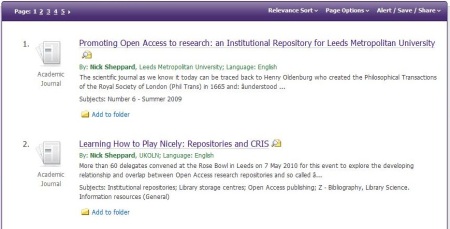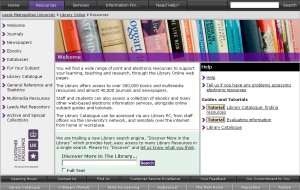Nick Sheppard, our Repository Developer, has written a guest blog post about integrating the Leeds Met Repository and Discover:
Historically, Institutional Repositories have been perceived as outward facing systems, designed to promote Open Access to institutions’ research outputs and/or openly licensed teaching and learning material, so called Open Educational Resources (OER).
As Repository Developer, however, a long term objective is also to ensure that the repository is well embedded in the institutional infrastructure and that relevant resources are easily discoverable, both within and without, by our own students and staff as well as scholars in the wider world, whatever discovery tools they may use and whatever their level of information literacy.
The EBSCO Discovery Service provides a mechanism, a one-stop-shop or library search engine, to explore a wide range of Library resources including the Library catalogue and electronic databases and we have been able to liaise with EBSCO to add the repository as a searchable target:
Forgive the self-promotion but it was an easy way to illustrate the functionality with my (only) two full-text publications returned from this ego-search!
And now for the technical bit…actually the process was fairly painless and taken care of by the EBSCO technical team with minimul input from me; I was simply required to complete a standard pro-forma with various information about our intraLibrary repository platform including metadata formats, OAI-PMH base URL and questions about specific data-elements. EBSCO then simply harvested and processed the OAI-PMH output and lo and behold it works, returning a full record comprising all of the metadata and links from the OAI output for the relevant record.
There have been one or two glitches, largely associated with idiosyncracies related to the repository itself and the EBSCO technical team have been responsive throughout; the main issue was that EDS was set by default to prioritise full-text and records were being returned from the repository and designated as full-text when they were, in fact, metadata only. In order to manage access and discovery, intraLibrary has been configured with a number of discrete and overlapping collections (which for the purposes of OAI are all discrete “sets”) and I had initially asked EBSCO to harvest all 4 faculty collections and the OER collection. However, in common with many repositories, and as part of a pragmatic approach to open access and a developing research management infrastructure, our repository comprises a large number of metadata only records for which it has either not (yet) been possible to procure full-text or copyright does not permit deposit. The problem has been resolved by ensuring that all records that include full-text are included in a separate collection (i.e. OAI set) which is now harvested along with the OER collection; the faculty collections are no longer harvested, meaning EDS will now only return research records that are full-text and OER (which, by definition, all provide access to a full resource.)
I am interested to see both whether the EBSCO Discovery platform will increase full-text downloads of research from the repository and particularly if it will raise the profile of OER – especially in the context of intraLibrary 3.5, due imminently, that will include an OAI-PMH harvest facility so that records from external OER repositories like Jorum can appear as a collection / OAI set in intraLibrary and hence discoverable from EDS.
Nick Sheppard
@mrnick/n.e.sheppard@leedsmet.ac.uk
Filed under: Uncategorized | Tagged: Ebsco Discovery Service, Leeds Met Library, repository | 1 Comment »






